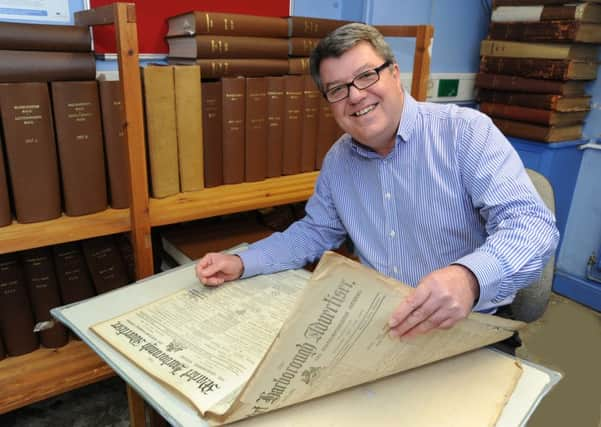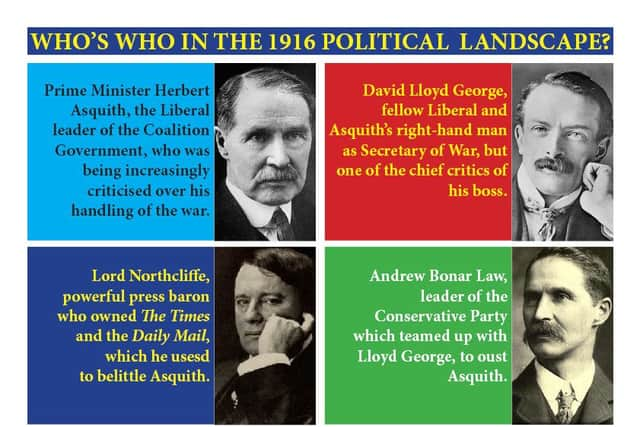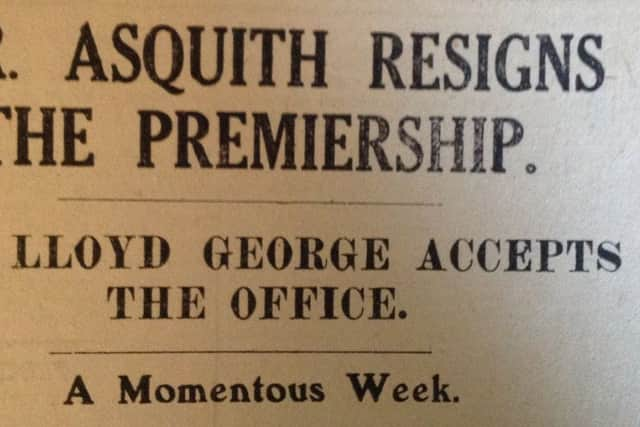JOHN DILLEY'S WWI BLOG: A momentous week in politics - and we're not talking Trump or Brexit


That’s quite a statement to make in a year when hundreds of thousands of young soldiers – on both sides of the conflict – were lying in muddy, makeshift graves on the Somme.
However, the change in Prime Minister from Herbert Asquith to his fellow Liberal David Lloyd George, which prompts the Advertiser’s headline, is recognised by readers as nothing short of a political coup.
Advertisement
Hide AdAdvertisement
Hide AdThink Michael Gove inserting a stiletto into the back of Boris Johnson this summer and then double it – that’s the magnitude of the political skulduggery going on between fellow MPs Asquith and Lloyd George.


The national newspapers had a huge part to play in the power games with Lord Northcliffe, owner of The Times and Daily Mail, constantly sticking the knife in.
As historian Niall Ferguson says in his book The Pity of War: “Northcliffe’s papers conducted a succession of campaigns aimed at intensifying the British war effort and harassing insufficiently bellicose ministers, including the Prime Minister, Herbert Asquith.
“The conventional wisdom today is that newspaper proprietors such as Rupert Murdoch wield excessive power; but their power pales into insignificance when compared with Lord Northcliffe’s during the First World War.
Advertisement
Hide AdAdvertisement
Hide Ad“Typical of Lord Northcliffe’s approach was his instruction to the Daily Mail editor, Tom Clarke, in December 1916: “Get a smiling picture of Lloyd George and underneath it put the caption `DO IT NOW’, and get the worst possible picture of Asquith and label it `WAIT AND SEE’ There is not much Kelvin MacKenzie could have taught him.”


The Advertiser’s editor stays out of the politics and sticks mainly to the facts rather than digging down deep into rumour and snide gossip but all the drama is there.
The account begins: “The past week has been one of grave import in the history of our nation. Rumours of a Cabinet crisis had been persistently abroad for some time and on Sunday at 11.45pm, the Press Bureau issued the following:
“The Prime Minister, with a view to the most effective prosecution of the war, has decided to advise His Majesty the King to consent to a reconstruction of his Government.”
Advertisement
Hide AdAdvertisement
Hide AdThe formal language – which means ‘Lloyd George has made his move now Asquith’s on his way out’ – is the culmination of a week of twists and turns which are all catalogued in the Advertiser.


The rest of the story is fairly dry to a 21 st century reader’s eye but those picking up the Advertiser in 1916 know how to unpick the drama – in particular the tension is taken up a notch from paragraph to paragraph with a key device: timing.
For example ‘shortly after nine o’clock on Tuesday night’ the Press Bureau circulated the announcement that Mr Asquith had handed his resignation to the King; a court circular was received just ‘an hour later’; Conservative leader Andrew Bonar Law went to the Palace ‘arriving at 9.30pm and leaving at five minutes past ten’. This meeting was for Bonar Law to turn down an invitation to be Prime Minister.
The Advertiser then ratchets the pressure up even more. “Events moved with startling rapidity.”
Advertisement
Hide AdAdvertisement
Hide AdOn Wednesday night at ten minutes past ten the Press Bureau issued a court circular from the Palace saying Lloyd George – with the ‘co-operation of Bonar Law’ – has consented to form a Government.


The King held a conference on Tuesday afternoon involving all the key political players – Asquith, Lloyd George, Bonar Law, First Lord of the Admiralty Arthur Balfour and Labour leader Arthur Henderson – by all subsequent accounts a pretty acrimonious affair.
The Advertiser goes on: “In well-informed quarters doubt was expressed whether Mr Lloyd George would be able to secure the co-operation of the Labour members but after a conference with them they decided to throw their lot with the new administration.”
The crisis was thus past and the court circular on Thursday night contained the following:
Advertisement
Hide AdAdvertisement
Hide Ad“The Right Hon D Lloyd George MP had an audience of the King this evening and His Majesty’s offer of the post of Prime Minister and First Lord of the Treasury, and kissed hands upon his appointment.”
A week certainly is a long time in politics.
This column is published every Monday by John Dilley on the Newspapers and the Great War website and will continue until the 100 th anniversary of the final armistice in November 2018.
John’s fellow researcher and De Montfort University lecturer David Penman is conducting a similar real-time project with the Ashbourne Telegraph. Check out his Great War Reports.